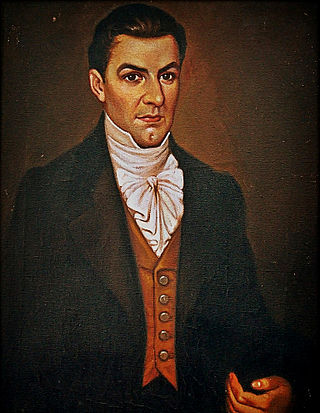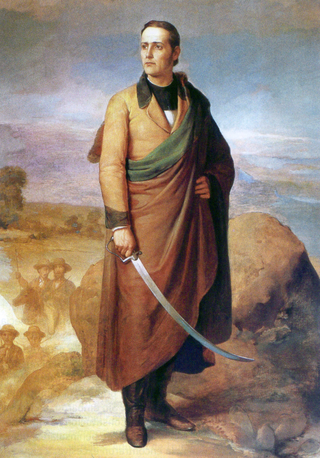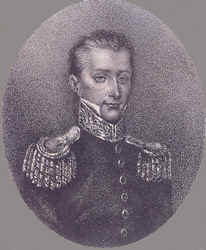External links
Surname list
This page lists people with the surname Iturbide. If an internal link intending to refer to a specific person led you to this page, you may wish to change that link by adding the person's given name(s) to the link.
Iturbide is a Basque surname, original from the region of Navarra, a province located north of Spain, bordering with France. It is Basque for "Road of the fountain". Notable people with the surname include:

Agustín de Iturbide, full name Agustín Cosme Damián de Iturbide y Arámburu and later known as Emperor Agustín I of Mexico, was an officer in the royal Spanish army. During the Mexican War of Independence he initially fought insurgent forces rebelling against the Spanish crown before changing sides in 1820 and leading a coalition of former royalists and long-time insurgents under his Plan of Iguala. The combined forces under Iturbide brought about Mexican independence in September 1821. After securing the secession of Mexico from Spain, Iturbide was proclaimed president of the Regency in 1821; a year later, he was proclaimed Emperor, reigning from 19 May 1822 to 19 March 1823, when he abdicated. In May 1823 he went into exile in Europe. When he returned to Mexico in July 1824, he was arrested and executed.

Manuel José Arce y Fagoaga was a decorated Salvadoran General and president of the Federal Republic of Central America from 1825 to 1829, followed by Francisco Morazán.

The Mexican Empire was a constitutional monarchy, the first independent government of Mexico and the only former colony of the Spanish Empire to establish a monarchy after independence. It is one of the few modern-era, independent monarchies that have existed in the Americas, along with the long-lasting Empire of Brazil (1822–1889) and the ephemeral First Empire of Haiti (1804–1806). It is typically denominated as the First Mexican Empire to distinguish it from the Second Mexican Empire of Emperor Maximilian (1864–1867). Although Mexico became a republic in 1824, it did so only after the failure of the empire under former military officer Agustín de Iturbide, who ruled as Agustín I, the sole monarch of this first empire. Monarchy was the default position for independent Mexico, called for in the political Plan of Iguala drafted by Iturbide, which united forces fighting for independence from Spain. The last Spanish viceroy signed the Treaty of Córdoba in September 1821 and the plan for monarchy in independent Mexico moved forward. Iturbide's popularity culminated in mass demonstrations on 18 May 1822, in favor of making him emperor of the new nation in the absence of any European royal agreeing to assume the throne. Congress approved the proposal and a sumptuous coronation ceremony followed in July 1822.
José is a predominantly Spanish and Portuguese form of the given name Joseph. While spelled alike, this name is pronounced very differently in each of the two languages: Spanish ; Portuguese.

Andrés Eligio Quintana Roo was a Mexican liberal politician, lawyer, and author. He was the husband of fellow independence activist Leona Vicario.

Mariano Matamoros y Guridi was a Mexican Roman Catholic priest and revolutionary rebel soldier of the Mexican War of Independence, who fought for independence against Spain in the early 19th century.
Ugarte or uharte is a Basque word meaning "island". It can also be spelt Huarte or Hugarte in Spanish. Notable people with the surname include:
Dr. Pablo de la Llave (1773–1833) was a Mexican Catholic priest, politician, and naturalist.

José Mariano Michelena was a Novohispanic and later Mexican, soldier and politician. He was among the early conspirators seeking to achieve Mexican independence, and also introduced coffee to Mexico.

Agustín Jerónimo de Iturbide y Huarte was the eldest son of the first Emperor of Mexico, Agustín I of Mexico. He was the heir apparent to the First Mexican Empire and a member of the Imperial House of Iturbide. Later in life, he served as a military officer in South America and also worked as a diplomat for the United Mexican States at the Mexican embassy in the United States and in London, after his military career had ended in South America.

José Matías Delgado y de León was a Salvadoran priest and doctor known as El Padre de la Patria Salvadoreña.
Agustín is a Spanish given name and sometimes a surname. It is related to Augustín.

The House of Iturbide is a former Imperial House of Mexico. It was founded by the Sovereign Mexican Constituent Congress on 22 June 1822 when the newly independent Mexican congress confirmed Agustín I's title of Constitutional Emperor of Mexico. He was baptized with the names of Saints Cosmas and Damian at the cathedral there. The last name Iturbide was originally from the Basque Country, Spain. Emperor Agustín abdicated and lived in exile with the prohibition on returning to Mexico. Despite that ban, he returned, was captured, and executed. Grandchildren of Emperor Agustín were adopted by Maximilian I of Mexico (1864-67), who had no biological children, and granted some status in the empheral Second Mexican Empire.

The following is an alphabetical index topics related to the Mexico.
Basque Mexicans are Mexicans of full, partial, or predominantly Basque ancestry, or Basque-born persons living in Mexico.
Arana is a surname that originates in Spain. Notable people with the surname include:

The Regency of the Mexican Empire was a period of transition in the history of the Mexican monarchy in the absence of the Emperor of Mexico and presided by a president of the same during the First Mexican Empire (1821–1823) and the Second Mexican Empire (1863–1867). The regency is the government of a State during the minor age, absence or incapacity of its legitimate prince.

Joseph Anton Lopez was a Mexican Catholic priest and Jesuit. Born in Michoacán, he studied canon law at the Colegio de San Nicolás and the Royal and Pontifical University of Mexico. He became acquainted with the future Empress consort Ana María Huarte and was made chaplain to the future imperial family. He was later put in charge of the education of all the princes in Mexico. Lopez was a close ally of Emperor Agustín de Iturbide, residing in Madrid for four years as his attorney and political informant, and accompanying him during his exile to Italy and England.

From January 1822 to July 1823, the Captaincy General of Guatemala, a former Spanish colony, was controlled by the First Mexican Empire, and briefly, the Supreme Executive Power—the provisional government that succeeded Mexican imperial rule. The captaincy general consisted of the provinces of Chiapas, Costa Rica, El Salvador, Guatemala, Honduras, and Nicaragua—the six southernmost provinces of the Mexican Empire. The incorporation of Central America brought Mexico to the height of its territorial extent.